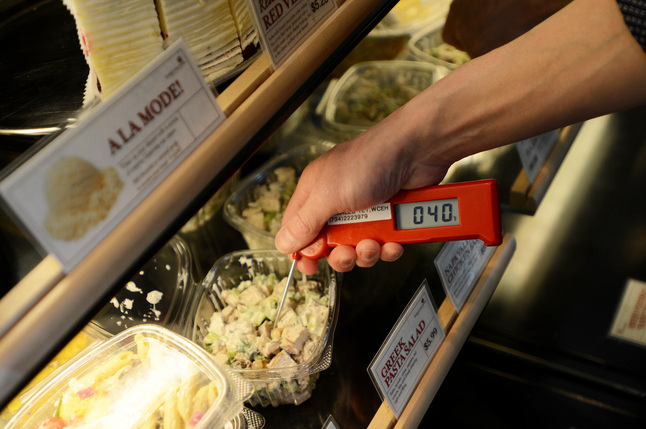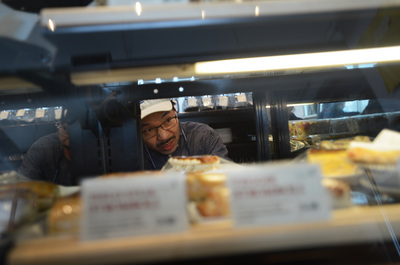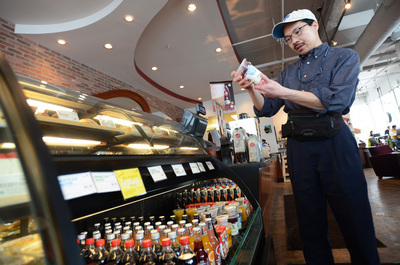Restaurant inspection 101: How it works in Washtenaw County

Washtenaw County Environmental Health Division Sanitarian Charles Yet uses a thermometer to check the internal temperature of a prepared Greek pasta salad in a case as he inspects Sweetwaters Coffee and Tea on Plymouth Road on Thursday, Jan. 31. Food should read no more than 2 degrees above 41 degrees for proper temperature.
Melanie Maxwell I AnnArbor.com
“If you’re doing your job correctly, the inspections shouldn’t make you nervous,” said Barb Cole, general manager of the Sweetwaters Coffee and Tea shop at 3393 Plymouth Road on the north side of Ann Arbor. “If you’re doing what you should be doing, there’s nothing to hide.”
The process used to determine those violations is detailed and intense. Inspections critically examine every nook and cranny of a restaurant’s operations and typically last three hours.
AnnArbor.com observed Washtenaw County Environmental Health sanitarian Charles Yet Thursday as he conducted the first inspection of 2013 for the Sweetwaters on Plymouth Road.
The inspection
Yet arrived at the coffee shop equipped with a fanny pack full of the tools of his trade: thermometers, a flashlight, chlorine test strips and a multitude of individually packaged disposable wipes.
Sweetwaters doesn’t prepare any of the snack food items that they sell, so it was a simpler inspection than one at a full-service restaurant.
Yet started with the front display. The cookies and baked goods did not have to be tested because they can be stored at room temperature, Yet said.
Randomly sampling prepared foods from the display coolers at the front counter, Yet took the temperature of several yogurt parfaits, wrap sandwiches, quiches, pasta salads and Stromboli.
A temperature of 41 degrees is the maximum that food can be in a refrigerator, with an error margin of about two degrees. Any warmer and there are concerns on the growth of listeria bacteria, Yet said.

Washtenaw County Environmental Health Division Sanitarian Charles Yet checks the temperatures of prepared foods in a case at Sweetwaters.
Melanie Maxwell I AnnArbor.com
Yet shook his head.
“That’s not good,” he said.
Items in the back of the cooler were about 38 degrees inside. Yet told Cole that the cooler was likely malfunctioning.
Cole immediately pulled the items that were not at the right temperature from the cooler. The sandwiches, quiche and pasta salad would be weighed out, documented for inventory purposes and then taken out of their plastic containers and discarded. The plastic would be recycled, Cole said.
Previous inspection records indicate the temperature of the foods in the front display cooler has been an issue as the management has tried selling different kinds of prepared foods.
Sweetwaters on Plymouth Road used to buy its quiche frozen and thaw it -- which presented a problem during a previous inspection. It now buys fresh quiche daily, Cole said.
Cole recently expanded her prepared sandwich offering this week, and hadn't used the front of the display cooler before.
Yet made a note of the priority violation and moved on to inspecting the area behind the counter where employees take orders and make the drinks.
He took the temperature of the jugs of milk in coolers that were used to make lattes, stuck his thermometer in cream cheese packets and yogurt containers. After each substance, Yet wiped his thermometer clean with a disposable wipe.
The sanitary buckets of cleaning solution also were tested for their chlorine levels. Two of the buckets used to clean the counter and milk steamer on the espresso machine had weak concentrations; Yet advised Cole to change them more often.
Peeking inside the dishwasher, Yet shone his flashlight through the machine to check the valves for clogs. He also checked the concentration of the chlorine cleaning solution after running the dishwasher.

Yet checks a yogurt parfait for a date.
Melanie Maxwell I AnnArbor.com
Underneath the ice maker, Yet also found some older dirt and debris that he said should be more thoroughly cleaned.
In the back of the house, Yet took out his thermometer once again to check the stock in the commercial refrigerator.
In addition to making sure that all the required sinks and storage procedures were being followed, Yet also checked the restrooms.
He washed his hands in each hand sink to verify that the faucets had hot water, plenty of soap and a way for people to dry their hands. The updated Food Law places a particular emphasis in making sure that there are enough supplies for people to wash their hands as a disease prevention mechanism.
Bathrooms are a good indication of what the back of the house of a restaurant looks like, Cole said.
“You can judge the cleanliness of the back of the house by the front of the house,” Cole said.
Yet also walked over to the restaurant’s commercial-sized trash bin and recycling bin located across the parking lot from the restaurant: Some of the doors on the bins weren’t shut because the bins were full, and Yet advised that Cole contact the management company for the building.
During his inspection Yet also reviewed policies and procedures with Cole for handling coffee creamer, milk pitchers and when Cole sends employees home when they're sick. Afterward, Yet took out his laptop and portable printer to file his report on site.
He sat Cole down to go over the priority violation and three core violations that he noted in his inspection:
- A priority violation for the sandwiches in the cooler that were above 41 degrees
- A core violation for the faulty refrigerator that was holding the sandwiches
- A core violation for the residue on the ice machine pump
- A core violation for some debris underneath the ice machine and under the refrigerators in the front of the house
The priority violations require a 10-day response time, which Yet said he likes because it has the public’s health more in mind.
There are several practices that Cole said she uses in her store with her employees that go above and beyond what is required by the Food Law.
Cole views inspections more as an opportunity to correct a problem, and said she has built a good working relationship with Yet.
The Food Law
The Washtenaw County Environmental Health Division is responsible for inspecting 1,116 licensed establishments and 105 vending locations -- including bars, restaurants, nursing homes, public cafeterias, shops and catering kitchens -- that it inspects twice a year for violations. The department has 7.5 full-time equivalent employees that conduct inspections.
Restaurant managers familiar with the "critical" or "non-critical" violation system during inspections are now being introduced to a three-pronged violation system, which is a result in the change in the state’s Food Law in October.
The most serious violation is now a "priority" violation, and typically involves direct hazards associated with foodborne illness. A "priority foundation" violation is a violation of a practice intended to prevent a priority violation. Both types of priority violations must be corrected within 10 days of an inspection or enforcement action will be taken, said Al Hauck, acting supervisor for Washtenaw County Environmental Health.
A "core" violation is related to general sanitation and facility maintenance.
The new policy focuses on prevention mechanisms and practices to prevent the spread of the five major food-borne illnesses: E. coli, salmonella, norovirus, shigella and hepatitis A.
Though the same procedures are used to conduct the inspection, certain violations have been made more severe and some have been made less severe.
Washtenaw County Environmental Health is scheduling the first inspection at each restaurant under the new food code as an educational practice this year.
Some restaurants are more difficult to deal with than others, Yet said, as some managers may think they know what they’re doing but may be violating codes.
Common violations include debris and dirt under equipment in hard-to-reach areas, Yet said, while the most concerning violations are raw foods stored incorrectly and at incorrect temperatures.
Repetitions of the same priority violation will mean that enforcement measures will be taken, Yet said. The restaurant’s manager will be brought in to the environmental health office to speak with the senior leadership as to why the violation keeps occurring, and the restaurant will have to pay a $126 fine.
“Most people get the message at that point,” Yet said.
If the meeting is not effective in correcting the violation, there will be a follow-up hearing.
If the hearing does not correct the problem, then the facility's license is revoked.
Both Yet and Cole said they don’t dine out often. If they do, they make use of Washtenaw County’s online restaurant inspection database.
Cole has 25 years of experience in the food service industry. When she walks in to a restaurant, the attitude and behavior of the staff is the first thing she notices: How they wear their hair; if they’re chewing gum or take frequent smoke breaks.
The cleanliness of the restaurant is the next thing Cole observes.
Managers have ultimate control over their staff and every detail of restaurant operations, Cole said, and that’s where the inspections are the most valuable in identifying areas where managers can make corrections.
“This job is not difficult; it’s just very detailed,” she said.
Amy Biolchini covers Washtenaw County, health and environmental issues for AnnArbor.com. Reach her at (734) 623-2552, amybiolchini@annarbor.com or on Twitter.


Comments
LuvAA
Thu, Feb 7, 2013 : 11:19 p.m.
Good to know that even Sweetwaters can have violations, but why does this feel like free advertising for Sweetwaters, when they don't even prepare their foods? How about some more coverage on other restaurants in the area? I'd also like to see a follow-up on what the process is like for the larger restaurants and if more is involved. Thanks for posting the number below too!
themommer
Thu, Feb 7, 2013 : 2:53 p.m.
Has anyone else noticed the jackets on the cashiers at McDonald's drive-thrus? They are filthy! Coated with grease and caked-on food. This makes me wonder about the cleanliness of McDonald's. And I've seen the cashiers unfolding french-fry containers in between taking cash. I thought cashiers were supposed to wash their hands after handling money before touching food. Okay they weren't touching food but the food will go into those cartons.
roadsidedinerlover
Sun, Feb 10, 2013 : 5:02 a.m.
Alot of those fast food places do not use the metal scoops when filling your pop order. That is a violation and who would want the wax from the cup in their drink? Gross!
justcurious
Thu, Feb 7, 2013 : 5:51 p.m.
I never wonder about the cleanliness of McDonalds..I know that most of them are places I don't want to go inside and eat at...at the window it's a crap shoot. As the article said... Bathrooms are a good indication of what the back of the house of a restaurant looks like, Cole said.... "You can judge the cleanliness of the back of the house by the front of the house," Cole said. And the bathrooms are pretty bad...
Amy Biolchini
Thu, Feb 7, 2013 : 2:31 p.m.
To report a foodborne illness from eating at a Washtenaw County establishment, call the main number for Washtenaw County Environmental Health at (734) 222-3800 during their business hours of 8:30 a.m. to 5 p.m. Monday through Friday. The same number should also be used if you want to file a complaint about a restaurant -- but be prepared to provide your name, address, phone number, name of restaurant, address of restaurant, date of the incident and the nature of the complaint. You can remain anonymous to the restaurant.
klhp
Thu, Feb 7, 2013 : 2:19 p.m.
How in the world is Asia City Restaurant still open for business?
roadsidedinerlover
Sun, Feb 10, 2013 : 5 a.m.
I agree..all that food in the buffet tables...scary!
Bubba43
Thu, Feb 7, 2013 : 2:18 p.m.
you need to post your phone number in the phone book so people can call environmental health to report problems.
Amy Biolchini
Thu, Feb 7, 2013 : 2:29 p.m.
I posted a comment below regarding contact information for the Environmental Health division so more people can see it.
Lizzy Alfs
Thu, Feb 7, 2013 : 12:30 p.m.
"The Washtenaw County Environmental Health Division is responsible for inspecting 1,116 licensed establishments and 105 vending locations...The department has 7.5 full-time equivalent employees that conduct inspections." Wow. That is a lot of inspections for 7 full time and 1 part time employee, especially when the inspections take three hours. Thanks for this story, Amy. I wonder how business owners feel about inspections and certain inspectors.
Katrease Stafford
Thu, Feb 7, 2013 : 5:59 p.m.
Interesting point, Lizzy. In addition to learning about larger restaurants, I wonder what the process is like for the inspectors in charge of inspecting the local universities because they have a ton of cafeterias, cafes, etc.
Lizzy Alfs
Thu, Feb 7, 2013 : 2:11 p.m.
Great point. Sweetwaters is probably one of the easier places to inspect. Amy: Any idea if a larger restaurant can take a lot longer than three hours?
johnnya2
Thu, Feb 7, 2013 : 1:08 p.m.
I think the three hour number might be low for some of the larger restaurants in town. A Sweetwaters, which is smaller and does not prepare its own food would seem easy, while some of the restaurants in older buildings or that are very large are difficult and time consuming.
A2comments
Thu, Feb 7, 2013 : 11:38 a.m.
Interesting article. Wouldn't you think with 25 years in the business and past temp issues, Ms. Cole would be regularly checking temps herself?
Amy Biolchini
Thu, Feb 7, 2013 : 2:24 p.m.
Barb Cole told me that she actively checks the temperatures of her food once a week to make sure everything is as it should be. The prepared sandwiches in the cooler had just been added that week, as Cole expanded her sandwich selection offerings. She hadn't used the front area of the cooler before. The temperature of the cooler was very cold -- at either 28 degrees or 32 degrees; I can't recall precisely. Cole said she would have a repairman out to fix the cooler right away.